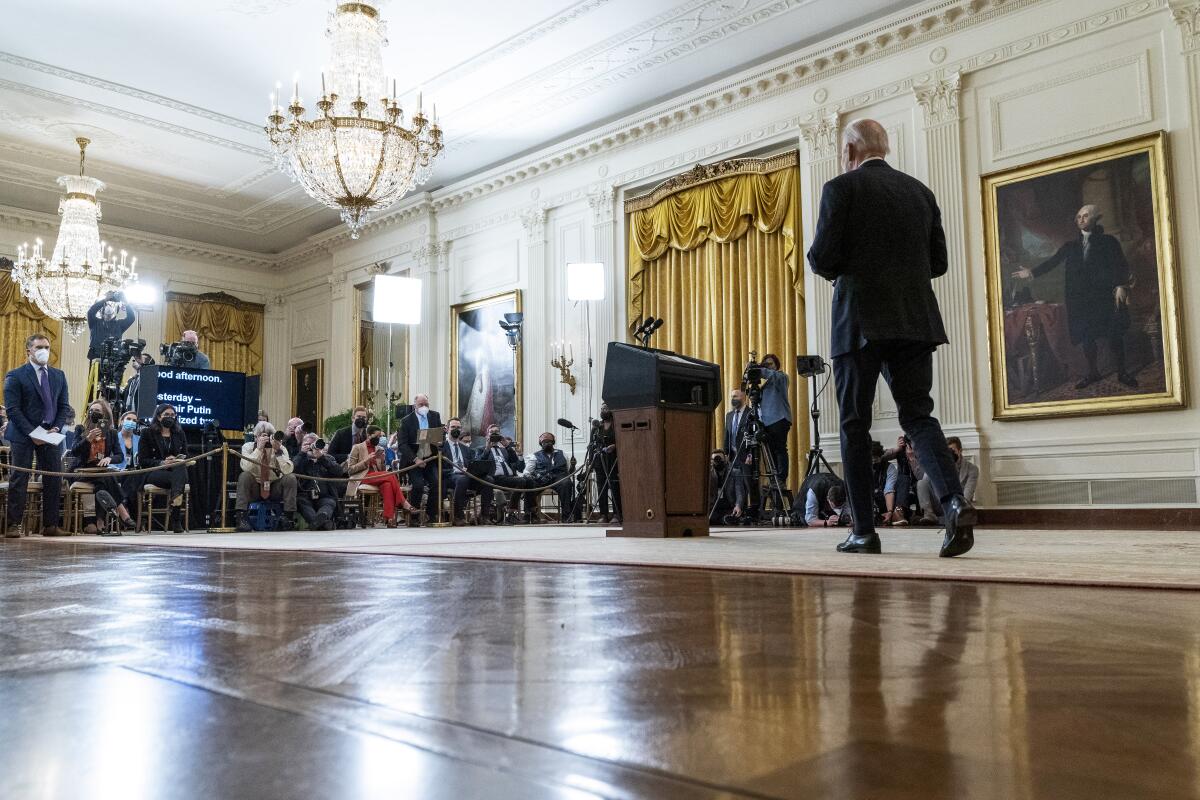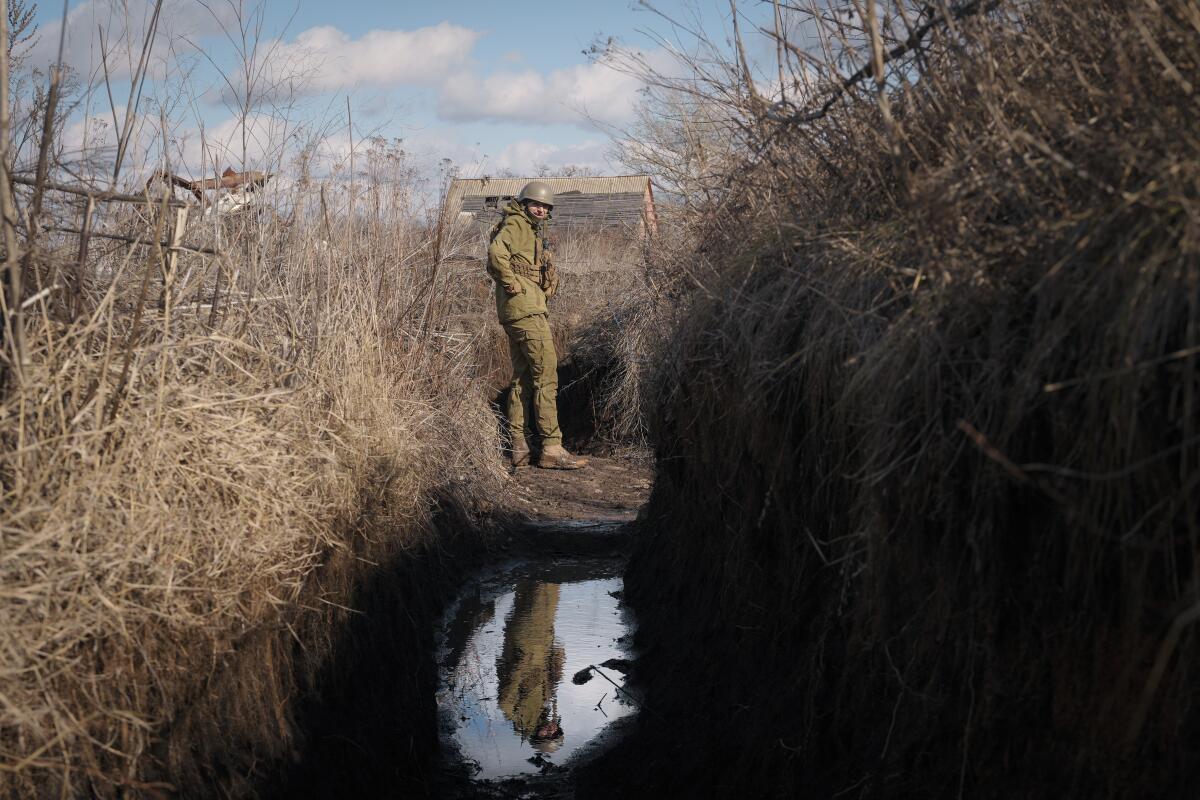Essential Politics: The U.S. faces a difficult path forward with Ukraine on the edge of war

It has been a hectic few days in Washington as Biden administration officials scrambled to respond to Russia’s looming invasion of Ukraine.
Vice President Kamala Harris was dispatched to a security conference in Munich to discuss the situation with allies. She was joined there by Ukraine’s president, Volodymyr Zelensky, who gave an impassioned speech that criticized the U.S. and NATO for not admitting his country into the alliance. Meanwhile, officials in Washington used every rhetorical tool in their arsenal to criticize the Russian troop buildup, expose “false flag” operations and prepare Americans mentally for a war in Europe.
When Russian President Vladimir Putin on Monday ordered troops to cross the border, Biden and his aides turned from diplomacy and finalized a package of sanctions on Moscow that they hope will send a strong enough message to deter further aggression. Experts say such measures are not likely to be enough to convince the autocrat to turn around his tanks.
Hello and welcome to Essential Politics. I’m Del Quentin Wilber, the Times’ White House editor. In seeking to make sense of what is going on in Ukraine and Washington, I turned to some of the best reporters in the business — Eli Stokols, The Times’ White House correspondent and Tracy Wilkinson, the newspaper’s State Department reporter and a longtime foreign correspondent. We spoke via email about how the world got here and the diplomatic balancing act the U.S. must now perform.
Our conversation has been lightly edited for length and clarity.
Get our L.A. Times Politics newsletter
The latest news, analysis and insights from our politics team.
You may occasionally receive promotional content from the Los Angeles Times.
Where are Russian forces being deployed?
Tracy: For months, Putin gradually positioned troops along Russia’s border with eastern Ukraine. He insisted they were merely engaged in military exercises. But the numbers grew, exceeding 100,000 by January. That’s when Putin also deployed forces to Belarus, on Ukraine’s northern border. U.S. intelligence increasingly warned of a possible invasion.
Russia already occupied Ukraine’s Crimean peninsula, following an incursion and illegal annexation in 2014.
Putin continued to claim he was not planning an invasion as world leaders implored him to pull back the troops. This continued until this week, when he announced that a region of eastern Ukraine, where Russia-backed militias were battling Ukrainian forces, constituted two independent republics. He called those troops — in Orwellian fashion — “peacekeepers.” The number of those forces deployed to the region has steadily been growing since Monday.
[More: Tracy wrote this very helpful explainer on why Putin is so obsessed with Ukraine.]
How did the U.S. and its allies work to stop an invasion? Was it at all effective?
Eli: If the ultimate measure of the administration’s effectiveness is full deterrence of an invasion, the answer would be no.
But it’s likely too soon to fully answer this question. Yes, Putin has again invaded Ukraine and violated its territorial sovereignty, ignoring the chorus of NATO allies who have — for months now — been threatening major economic consequences. By disclosing the intelligence about what Moscow was planning, they also were trying to take away any element of surprise. But Putin is effectively shrugging at the West’s threat of economic sanctions and carrying out his plans exactly as President Biden and others predicted he would.
So far, however, the advances have been limited to territories Russia has effectively controlled for several years. That is a factor the White House has pointed to a lot in the last 48 hours in explaining why they haven’t yet hit the button on the more wide-reaching sanctions package.
Putin’s comments in speeches this week and the months-long massing of 150,000 troops on Ukraine’s borders don’t provide much cause for optimism that he might be satisfied by laying claim to the separatist regions of the former Soviet republic.

Can you explain the balancing act President Biden faces here?
Eli: I touched on one of the ways the White House attempted to keep Putin off balance: calling attention to his plans so publicly. The other element of its approach over the last several months has been coalition-building, unifying NATO allies around a response to Russia’s troop buildup and potential aggression. They have been hoping to demonstrate to Putin and the world (see: Beijing) that the West remains unified in response to Moscow.
Putin’s attempt to further weaken a strained transatlantic alliance has thus far appeared to backfire. I was at the Munich Security Conference with Harris last weekend, and attendees clearly felt a renewed kinship and more robust commitment to the democratic principles they’ve been gathering to discuss and defend since 1963. Leaders with unique concerns have coalesced around their opposition to Putin and their shared willingness to absorb the potential economic impact of a new cold war with Moscow.
Putin may hope that operating in a gray area will lead to new daylight among NATO allies, but the initial response has been notably unified. Germany, in fact, led the way Tuesday by announcing it was halting the Nord Stream 2 gas pipeline, an energy project Putin has long sought.
That came after a lot of overnight consultations with the Biden administration. Chancellor Olaf Scholz, whose wobbly initial response to Russia left many worried about his resolve, has now shown he is firmly part of the group. And the White House, even as domestic pressure mounts for a stronger response to Putin, has stayed committed to the incremental approach of ratcheting up sanctions. Although there is plenty of reason to believe sanctions will not deter Putin, the allies remain unified and continue to work to calibrate their response to specific Russian actions, maintaining a united front.
What does diplomacy look like going forward?
Tracy: Member states of the European Union are often accused of dithering in response to crisis. But this time we saw some energetic reactions that even came ahead of Washington’s announcement of sanctions.
From Britain to Australia, governments meted out economic punishments on Moscow, many targeting Russian billionaires in Putin’s inner circle and banks that cater to them. Germany suspended work on a gas pipeline from Russia that is essential to Western Europe’s energy needs but will be a cash cow for Putin. Construction of the Nord Stream II pipeline is complete, but the project must still pass through a certification process by Germany.
So far, events in Ukraine have proven disastrous for the business of diplomacy. An intense and senior-level campaign to deter Putin — with presidents calling or meeting with him and countries’ top diplomats in frenzied consultation — failed to stop the Russian leader’s invasion. U.S. Secretary of State Antony J. Blinken canceled a meeting with his Russian counterpart planned for this week, and the prospect of a summit with Biden and Putin is off the table.
There are other potential mediators. Finland, for example, has a reputation for being neutral in disputes between Russia and the West, or the Organization for Security and Co-operation in Europe, whose 57 member states include Russia and who, despite its unwieldy size, has had success in pacifying other conflicts like the Balkan wars in the 1990s. But Putin has always contended that the only negotiator who mattered was the United States.
Asked if diplomacy remained a possible path to peace, Blinken was grim.
“So we, our partners remain open to diplomacy, but Moscow needs to demonstrate that it’s serious,” he said Tuesday. “The last 24 hours it’s demonstrated just the opposite.”
Our daily news podcast
If you’re a fan of this newsletter, you’ll love our daily podcast “The Times,” hosted every weekday by columnist Gustavo Arellano, along with reporters from across our newsroom. Go beyond the headlines. Download and listen on our App, subscribe on Apple Podcasts and follow on Spotify.
More about the situation in Ukraine
— Whatever the consequences for Russia of the new sanctions, the invasion of Ukraine and ensuing global standoff will further darken the outlook for the U.S. economy, Don Lee reports.
— Nabih Bulos reports from New York, Ukraine, a few miles from the contact line that for years marked the tense stalemate between the Ukraine government and its Moscow-backed separatist adversaries. Residents there wonder how far Russian troops will push into their country and whether war will come to their town.

Enjoying this newsletter? Consider subscribing to the Los Angeles Times
Your support helps us deliver the news that matters most. Become a subscriber.
The view from Washington
— The U.S. Capitol Police and the Washington, D.C., government have requested help from the National Guard to respond to an expected truck convoy aimed at disrupting traffic ahead of the March 1 State of the Union, Sarah D. Wire reports.
— David G. Savage reports that the Supreme Court agreed to decide whether a conservative Christian woman in Colorado who designs websites has a free speech right to turn away same-sex couples, even though a state civil rights law requires businesses to be fully open to all.
— This week, the court also formally rejected former President Trump’s effort to block release of documents from his administration to the House Jan. 6 Select Committee, bringing a formal end to his executive privilege claims in connection with the records.
The view from California
— Two prominent Latino Democratic elected leaders are battling to become a new member of Congress, writes Seema Mehta. The race to represent a swath of Southern California that sweeps from southeastern Los Angeles cities to Long Beach will be among the state’s most contested intraparty battles.
— From John Myers and Taryn Luna: California voters are open to the idea of creating a legal market for sports betting, but fewer than half of those surveyed in a new poll are sure of their support. It’s an unsettled finding ahead of a multimillion-dollar political battle in November.
— Amid intense criticism, Los Angeles County Dist. Atty. George Gascón staunchly defended his handling of a politically fraught case: the prosecution of a transgender woman charged with sexually assaulting a child. Then he reversed course, saying this week that his approach was incorrect, report Harriet Ryan and James Queally.
Sign up for our California Politics newsletter to get the best of The Times’ state politics reporting.
Stay in touch
Keep up with breaking news on our Politics page. And are you following us on Twitter at @latimespolitics?
Did someone forward you this? Sign up here to get Essential Politics in your inbox.
Until next time, send your comments, suggestions and news tips to [email protected].
Get the L.A. Times Politics newsletter
Deeply reported insights into legislation, politics and policy from Sacramento, Washington and beyond. In your inbox three times per week.
You may occasionally receive promotional content from the Los Angeles Times.




